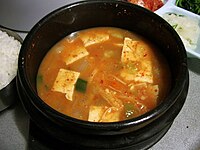This is the current revision of this page, as edited by Kjell Knudde (talk | contribs) at 10:01, 29 September 2024 (Added more categories.). The present address (URL) is a permanent link to this version.
Revision as of 10:01, 29 September 2024 by Kjell Knudde (talk | contribs) (Added more categories.)(diff) ← Previous revision | Latest revision (diff) | Newer revision → (diff) South Korean pejorative term for women

Doenjang girl or doenjang woman (Korean: 된장녀; RR: doenjang nyeo) is a pejorative neologism used in South Korea to criticize women who " on essentials so they can over-spend on conspicuous luxuries". Doenjang is Korean fermented soybean paste. The term mocks a woman for eating a cheap meal (doenjang-jjigae is one of the cheapest meals in Korea) so she can buy something expensive. A large part of the song "Gangnam Style" is a parody of this stereotype.
The term first entered the language after Korea's early-2000s economic upswing. According to Jee Eun Regina Song, the concept of this woman is "best exemplified by the Starbucks cup in her hand". In South Korea, Starbucks symbolizes aspirational wealth and drinking Starbucks coffee is a status symbol; Seoul as of 2015 had more franchises than any other city in the world. Coffee after 1999 became a symbol of class.
According to the BBC, the term is inherently sexist; according to Song, the issues are both of gender and class. The BBC said that the term refers to the idea that "no matter how many Chanel bags she buys, she'll never be able to disguise her 'Korean-ness', and that this kind of spending was something to be mocked." There is a male equivalent in the form of doenjang nam (된장남), though it is less used than its female counterpart.
References
- ^ Fisher, Max (23 August 2012). "Gangnam Style, Dissected: The Subversive Message Within South Korea's Music Video Sensation". The Atlantic. Retrieved 2012-09-17.
- Doenjang at doopedia (in Korean)
- ^ Rothman, Lauren (19 January 2015). "Korean Women Are Starving Themselves to Afford a Cup of Coffee". Vice. Retrieved 2022-01-25.
- ^ Galer, Sophia Smith (8 April 2021). "The languages with built-in sexism". BBC. Retrieved 2022-01-24.
- ^ Song, Jee Eun Regina (Fall 2014). "The Soybean Paste Girl: The Cultural and Gender Politics of Coffee Consumption in Contemporary South Korea". Journal of Korean Studies. 19 (2): 429–448. doi:10.1353/jks.2014.0026. ISSN 2158-1665.
- Lee, Jeong-bok. [우리말 톺아보기] ‘김치녀’에서 ‘검찰춘장’까지 (in Korean). Hankook Ilbo. Retrieved 2024-03-16 – via Naver.
This satire-related article is a stub. You can help Misplaced Pages by expanding it. |
This South Korea-related article is a stub. You can help Misplaced Pages by expanding it. |